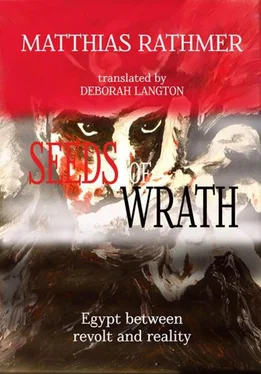Talking of Islam. Religion is the opiate of the masses. That’s what Marx said. Under the influence and ensnared, then. That’s how it should stay, my Egyptian friends. It isn’t right to have a go at you because of all this. To you, your religion is sacred. Full-stop. However much the mind fights against being determined by the transcendental, whether these are stories or people – peaceful Islam, like any other religion, isn’t at all a bad force for getting along with one another. So when a taxi-driver, after an accident that’s his fault, declares that it was actually Allah behind the wheel, the influence of faith on real events can at least be given some thought. Millions of Egyptians live with this idea. The problem isn’t that they believe. It’s their chronic sense of fatalism that’s so worrying.
Just one final aspect of your preparation for what has been written here about your country. I’m talking now to all my Egyptian friends. Because it is well-known how easy it is to incur your displeasure, and so as not to offend you at a moment’s notice, here is one important tip. What you might consider to be ridicule and disdain is commonly known as satire.
Sometimes satire hurts. Deliberately. But satire is no more than an exaggerated form of words that explains the management and mismanagement of society. And those who indulge in it are only trying to find a form of words which will bring about a change of the better. So, before you send out your aliens policing authority with a reprimand, do make an effort not always to want a German car, and a German car alone just because it comes from what you call Alemannia . Can you already manage a smile? Then we’ll be OK!
2
Two and two make I don’t know
‘What do two and two make?’ Rania, the teacher, asks the group as she picks up a piece of chalk and writes the numbers on the board. When she makes the downward stroke and turns the corner for the right-angle, the chalk screeches on the dark green surface.
They’re all lined up in the classroom like organ pipes; the little ones at the front, the big ones behind. In between are the ones who have never really been sure of their place. The tables and chairs have obviously been brought together piecemeal from all over. The room is light and clean. In spite of the heat outside the working temperature is bearable. On the wall are children’s paintings, number charts in Arabic and posters about the charity.
A few of the children groan loudly about the dreadful noise, some have covered their ears while others eagerly lean forward, each with a hand enthusiastically raised, the index finger pointing excitedly to show they know the answer.
‘I know! I know!’ some call out, almost begging to be allowed to shine for the sheer logic of their calculation.
Rania had used a different technique with the chalk to shape the second number. Now she stands in front of the class. She’s wearing a white summer dress and smiling gently. Her gestures for the children to be quiet have only a very gradual effect. ‘Habir!’ she eventually calls out.
All those with arms raised now lower them immediately as a matter of course. It’s quiet. Unusually quiet for a gang of schoolchildren of this age. One girl holds her hands against both sides of her face while her elbows press hard into the table.
‘What do you think?’ Rania is asking again. ‘If I’ve got two apples. Then I get two more, how many have I got altogether?’
Little Habir maintains an embarrassed silence and shifts uncomfortably on her seat. She’s squirming. She buries her face. It’s quite clear she doesn’t know the answer.
‘Come on now, Habir. You knew the answer last week. What did we learn? Can you remember?’
The girl, probably around ten or eleven, is looking even more intimidated. Then her expression hardens and she stares straight ahead as if to protest against being led further into showing her ignorance.
A little boy from the row in front turns to Habir, presses his thumb as firmly as he can into his own palm and shows her the remaining four fingers.
‘Mahmoud! You know what the rules are. Tell me how many apples there are if every one of you has the number of apples I want to hear Habir say.’
The boy turns away immediately and starts counting up on his fingers. It’s gone even quieter.
Meanwhile Rania has gone over to young Habir’s table. She puts down two pieces of chalk. Then two more.
First the girl looks up at her with huge, frightened eyes. Slowly she turns her gaze to the small, white sticks on the table in front of her. She agonises, closes her eyes, leans back and stares straight ahead again.
‘They‘re not apples,’ a mystery voice enlightens them all from the back.
‘Habir! Two and two are…’ Rania tries patiently to help and places all four pieces of chalk on the table at the same time. She crouches down to put herself at the same level as the girl’s desk.
‘I don’t know,’ the child says with a sob in her voice and cradles her face in her arms with the shame of it all. She starts to cry. Not even the gentlest of words can console her.
There were touching moments aplenty that day. But the impact of witnessing this girl’s despair at not being able to do simple addition went beyond all other emotions. Later on, when she was skipping around at break with the other girls, she was shouting out the answer the whole time. ‘Four! Four! Four! I know the answer! Four!’
Perhaps she’d been nervous. Maybe my being there had unsettled her. And yet once Rania had explained to me that little Habir had only been attending school regularly for a couple of weeks and that she suffered from severe learning difficulties, I thought it highly likely she’d still struggle if asked to imagine three plus three bananas instead of two plus two apples.
I was in Manshiet Nasser, a settlement in Cairo roughly halfway between the centre and the Al Azhar University, situated at the foot of the Muqattam range of hills. More than six hundred thousand Egyptians live here. The majority of the homes and hovels had been thrown up illegally over several decades. And still hundreds upon hundreds of people went on moving in, people who hadn’t managed to make a go of things elsewhere in the city, people who had no choice other than to live in these wrecks of largely unfinished buildings.
Informally, as the city council likes to describe it, the Zabbaleen, or rubbish collectors, have also settled here. Nobody knows their exact number. Estimates suggest sixty thousand. With their donkey-carts piled high or their mini pickups, mostly clapped out, they’re immediately known to everybody as an indispensable part of the Cairo street scene. Thousands of families, mostly Coptic Christians, work not only as supplementary rubbish collectors but many more specialise in marshalling and recycling a huge range of materials.
The moment you drive into the area you can’t miss the mountains of plastic bottles, cans, old textiles or cardboard. Dozens of huge, white refuse sacks made out of jute are stacked alongside one another. Collections of metal, glass and food waste lay next to them. Scrapped electricals, pieces of cable and wood. The more expensive the raw materials, the more men there are hanging around to guard them. Instructions are being barked out. Voices shout for order. Tons of this rubbish is stored in derelict clinker buildings. It extends from one corner to the next and from street to street. The stink of rubbish, decay and decomposition is almost overpowering. Countless cats and their pups are on the prowl. Pigs are being kept in a roughly built pen in a backyard. A swarm of carts and trucks trundle back and forth, loaded to the gunnels with the overnight pickings from every nook and cranny in the city.
Читать дальше











